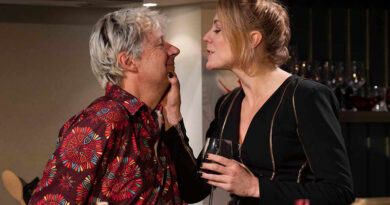“Indecent”, Menier Chocolate Factory
Neil Dowden in Southwark
19 September 2021
The Menier Chocolate Factory finally reopened in September with Paula Vogel’s Indecent, which had only reached preview stage when the theatre was forced to close due to the Covid lockdown in March last year. Pulitzer Prize winner Vogel’s 2015 play is about the extraordinary events surrounding God of Vengeance by the Polish-Jewish writer Sholem Asch, which featured the first lesbian kiss on a New York stage and which was shut down on Broadway on the grounds of obscenity in 1923. Spanning the first half of the twentieth century, Indecent explores serious themes of artistic freedom, religious dogmatism, homophobia, anti-Semitism, and McCarthyism while also joyfully celebrating the artists who risked their careers and lives to put on a show.

Alexandra Silber as Dorothee.
Photo credit: Johan Persson.
Indecent takes the form of a play within a play within a play. At the outset, stage manager Lemml introduces the troupe of actors and musicians who will be telling the story of God of Vengeance, including excerpts from Asch’s controversial work. As the actors line up on stage, ash pours out of their sleeves – a powerful reference to the horrible fate that awaited so many Jews in Europe during the Holocaust.
We are taken back to 1906, when Asch presents his Yiddish play God of Vengeance – about the love between a prostitute and the daughter of the brothel’s owner – to a local salon. He is advised to “burn it” after it receives a largely negative response from those appalled by its lesbian love story, Jewish brothel setting, and desecration of a Torah scroll. But with the support of the enthusiastic young tailor turned stage manager Lemml, the play becomes a big hit across Europe and in New York in the years before the First World War.

Finbar Lynch as the Stage Manager.
Photo credit: Johan Persson.
After the war, an English-language version is commissioned for a wider audience in New York, with Asch naively agreeing to change the basis of the relationship between the two female protagonists from mutual love to manipulative seduction for the Broadway production. The producer and cast are arrested for obscenity (although their subsequent conviction is eventually overturned on appeal). Asch is convinced that this is a result of an anti-Semitic plot, but it is revealed to have stemmed from an American rabbi scandalized by the play because he and his supporters regard it as perpetuating negative Jewish stereotypes.
Meanwhile, in Europe anti-Semitism is on the rise again, and in 1943 we see Lemml leading a few starving actors in a performance of the play in the Łódź Ghetto before they a re rounded up by the Nazis. The persecution continues even after the Second World War, as Asch is being hounded by the House Un-American Activities Committee for his communist sympathies and is obliged to relocate from New York to England.
Some of what happens in Indecent – both on- and off-stage – is of course disturbing and even tragic, but Vogel’s play is far from a grim history lesson. It is not only deeply moving but also very entertaining. Much credit must go to director Rebecca Taichman (who collaborated with the author from the start and who won a Tony Award for the 2017 Broadway production) for this lively, engaging, and inventive European premiere. The show includes live Klezmer music (by Lisa Gutkin and Aaron Halva), song, and dance. It almost has the feel of a musical, with fluid movement between scenes.
Riccardo Hernandez’s set is dominated by a gold proscenium arch that conveys the play’s meta-theatricality. Tal Yarden’s projections, including the text of the court’s judgment against God of Vengeance, are strikingly emblazoned across the stage and performers. Musical director Merlin Shepherd leads the spirited three-piece Klezmer band who also participate in the action, with dynamic choreography from David Dorfman.
The cast of seven do a great job playing 42 roles (including a cameo of Eugene O’Neill!). Finbar Lynch impresses as the fully committed Lemml, kindly shepherding his actors but also drawing us into the story as he directly addresses the audience with quiet dignity. Joseph Timms plays the optimistic younger Asch, while Peter Polycarpou embodies the writer as a world-weary old man, in addition to playing the larger-than-life actor Rudolph Schildkraut who starred in Max Reinhardt’s Berlin theatre production as well as in the New York one. Alexandra Silber and Molly Osborne are delightful as the actresses playing Asch’s lovers who are in a romantic relationship off stage as well as on; the show ends with a visionary coup de théàtre as they dance in the rain – free at last.









